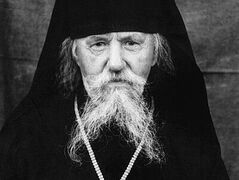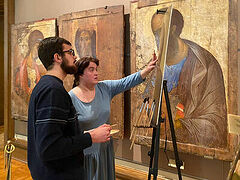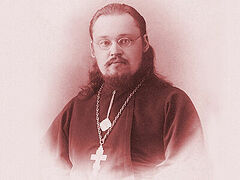Hieromartyr Alexander Krutitsky
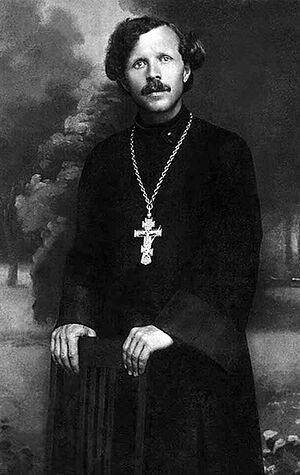 Hieromartyr Alexander Krutitsky On the day of the martyrdom of the holy New Martyr Mikhail the way to Golgotha began for another holy martyr of Shchelkovo—Priest Alexander Krutitsky.
Hieromartyr Alexander Krutitsky On the day of the martyrdom of the holy New Martyr Mikhail the way to Golgotha began for another holy martyr of Shchelkovo—Priest Alexander Krutitsky.
Alexander Sergeyevich Krutitsky came from an ancient family of priests. He was born in June 1898 in the village of Saltykovo, Bronnitsy district of Moscow province. In early childhood Alexander lost his mother, and when he was fifteen his father, who had served as a reader at the church in Saltykovo, died. The orphaned boy was adopted by his father’s sister, his godmother Elizaveta Matveyevna. According to their family tradition, as the youngest child Alexander was sent to the Pererva Theological School, after which he entered the Moscow Theological Seminary.
The war, which broke out in 1914, prevented Alexander from completing his theological education, and he became, following his father’s example, a reader at the church where his father used to serve. In 1919, the Krutitskys bought a house in the village of Obraztsovo, Shchelkovo subdistrict, not far from the village of Bolshoye Khomutovo, where Alexandra’s older sister Maria and her husband already lived. Soon, with the blessing of his godmother Elizaveta Matveyevna, Alexander Sergeyevich married a native of Obraztsovo, Pelageya Petrovna Tsyganova, who was destined to outlive her husband by forty-three years. Pelageya Petrovna died at the age of eighty-six in 1981.
After 1922, Reader Alexander Krutitsky was ordained deacon at the same Church of the Nativity of the Theotokos. After the publication of the document, “On Measures to Strengthen Anti-Religious Work”, which initiated mass arrests of clergy and laypeople and the closure of churches, Deacon Alexander Krutitsky was arrested for the first time and detained for ten days.
In 1933, Deacon Alexander, despite the wave of Stalinist repressions, submitted a petition to the ruling hierarch for ordination to the priesthood. He was ordained and assigned to the Church of the Protecting Veil of the Mother of God in the village of Khomutovo and was appointed its rector.
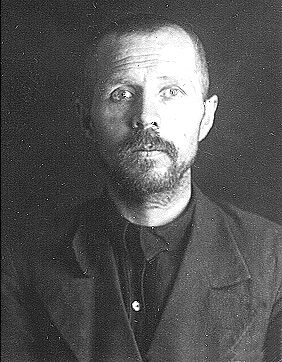 Hieromartyr Alexander Krutitsky in jail The parishioners immediately “came to love him for his meek disposition and unselfishness. Three widows who had lost their husbands in the First World War lived in the village. The priest always helped them and before plowing his land he would plow and sow theirs.”1
Hieromartyr Alexander Krutitsky in jail The parishioners immediately “came to love him for his meek disposition and unselfishness. Three widows who had lost their husbands in the First World War lived in the village. The priest always helped them and before plowing his land he would plow and sow theirs.”1
Priest Alexander Krutitsky’s family had three children. Continuing to live in Obraztsovo, Fr. Alexander would return home from Khomutovo after the service on his own. He would walk along the valley, through the meadow and the Ucha River. His son, Yevgraf Alexandrovich, for the rest of his life retained memories of how his father taught them to enjoy the beauty of nature. Having a wonderful voice, he sang beautifully. His parishioners would always remember the church services of those years. The fervor with which Fr. Alexander served the Lord, of course, annoyed the local authorities…
He was arrested on the night of March 2 to 3, 1938.
“He was ready for arrest and accepted his lot calmly. During the search, not only his books were taken away, but also things that, from the point of view of NKVD officers, were at least of some material value: One earring was taken from the priest’s wife, and the other was torn out.”2
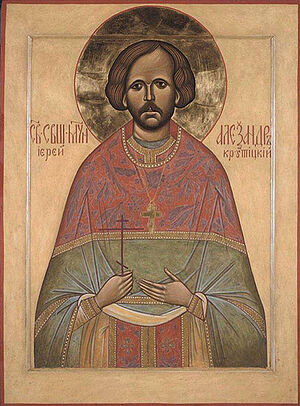 Hieromartyr Alexander Krutitsky On March 5, at a Moscow prison, Priest Alexander was charged with “being hostile, conducting counter-revolutionary activity among others.”3 During the investigation he was asked the question:
Hieromartyr Alexander Krutitsky On March 5, at a Moscow prison, Priest Alexander was charged with “being hostile, conducting counter-revolutionary activity among others.”3 During the investigation he was asked the question:
“The investigation has sufficient information that you were engaged in anti-Soviet activity. Do you plead guilty of this?”
“No, I do not plead guilty.”
On June 14, 1938, Alexander Krutitsky was sentenced to death by the judicial troika at the NKVD Directorate of the USSR in the Moscow region. On July 1, 1938, the sentence was carried out at the Butovo firing range.
At the Jubilee Bishops’ Council of 2000, Priest Alexander Krutitsky was canonized together with a host of New Martyrs and confessors of the Russian Church. He was the first canonized saint of the Shchelkovo land.
Holy New Martyr Vasily Krylov
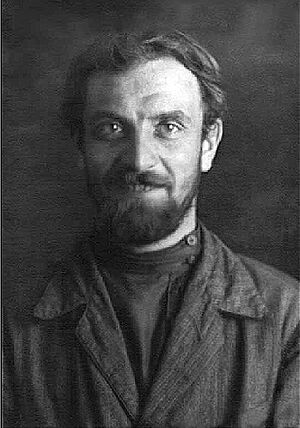 Holy New Martyr Vasily Krylov in jail The holy Martyr Vasily was born in 1906 in the village of Podlipichye of the Dmitrov district, the Moscow province, to the family of Reader Sergei Krylov.
Holy New Martyr Vasily Krylov in jail The holy Martyr Vasily was born in 1906 in the village of Podlipichye of the Dmitrov district, the Moscow province, to the family of Reader Sergei Krylov.
After graduating from a village school at the age of eleven he entered the Dmitrov Theological School, which was closed by the authorities a year later. At that time, his father was seriously ill, and Vasily began to help him in church to read during services.
Very early, at the age of twenty, Vasily was ordained deacon, and five years later a priest.
Fr. Vasily would be assigned to the Holy Trinity Church in the village of Ryazantsev in the Shchelkovo district of the Moscow region in 1934, after a three-year stay in the rear volunteer military forces, where he had been sent as a disenfranchised person due to his priesthood. But he was not destined to serve at the Holy Trinity Church for long. A very young, active and zealous pastor, who immediately set about converting young people who had strayed from the right path to the faith, could not but cause concern to the authorities.
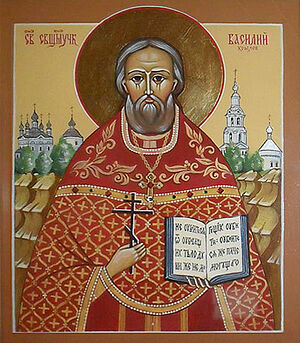 Holy New Martyr Vasily Krylov “After the secret order of the NKVD on mass arrests, Fr. Vasily was among the first to be arrested in the Shchelkovo district on August 16, 1937 and immediately interrogated.”4
Holy New Martyr Vasily Krylov “After the secret order of the NKVD on mass arrests, Fr. Vasily was among the first to be arrested in the Shchelkovo district on August 16, 1937 and immediately interrogated.”4
The interrogations and the subsequent charges were arranged in a way that had already been worked out by that time. The charge of counter-revolutionary activity based on perjury, recognized as false by the accused.
On October 13, 1937, the NKVD troika sentenced Fr. Vasily to ten years in a labor camp. He died on May 31, 1942 in Sevzheldorlag, situated in the autonomous Republic of Komi within Russia.
On May 7, 2003, by decree of the Holy Synod of the Russian Orthodox Church. the name of Priest Vasily Krylov was included in the Synaxis of the New Martyrs and Confessors of Russia.
***
The New Martyrs of the Shchelkovo land, ranked among the host of the New Martyrs of the Russian Church, being our spiritual ancestors, gave their lives on the “altar” of faithful Russia so that we could freely confess our faith today. Therefore, we must always remember and follow their call to us: “O Holy Rus’, preserve the Orthodox faith as in it is your confirmation.”

